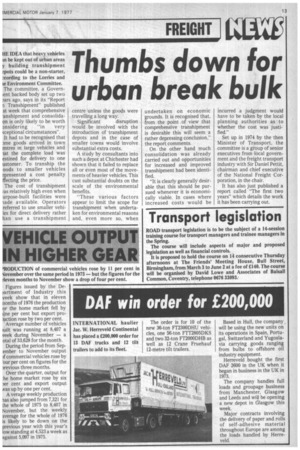Thumbs down for urban break bulk
Page 15

If you've noticed an error in this article please click here to report it so we can fix it.
HE IDEA that heavy vehicles m be kept out of urban areas y building transhipment spots could be a non-starter, .!.cording to the Lorries and ie Environment Committee. The committee, a Governlent backed body set up two ears ago, says in its "Report a Transhipment" published St week that comprehensive 'anshipment and consolidaon is only likely to be worth 3nsidering "in very Kceptiona I circumstances".
It had to be recognised that rile goods arrived in town entres in large vehicles and at the complete load was estined for delivery to one ustomer. To tranship the oods to smaller vehicles !presented a cost penalty ffecting the price.
The cost of transhipment ras relatively high even when urpose-built facilities were lade available. Operators referred to use smaller vehiles for direct delivery rather han use a transhipment centre unless the goods were travelling a long way.
Significant disruption would be involved with the introduction of transhipment depots and in the case of smaller towns would involve substantial extra costs.
A study by consultants into such a depot at Chichester had shown that it failed to replace all or even most of the movements of heavier vehicles. This cast substantial doubts on the scale of the environmental benefits.
"These various factors appear to limit the scope for transhipment when undertaken for environmental reasons and, even more so, when undertaken on economic grounds. It is recognised that, from the point of view that comprehensive transhipment is desirable this will seem a rather depressing conclusion," the report comments.
On the other hand much consolidation was already carried out and opportunities for increased and improved transhipment had been identified.
"It is clearly generally desirable that this should be pursued whenever it is economically viable. In cases where increased costs would be incurred a judgment would have to be taken by the local planning authorities as to whether the cost was justi-* fled."
Set up in 1974 by the then Minister of Transport, the committee is a group of senior executives from local government and the freight transport industry with Sir Daniel Pettit, chairman and chief executive of the National Freight Corporation, in the chair.
It has also just published a report called "The first two years" which details the work it has been carrying out.




















































































